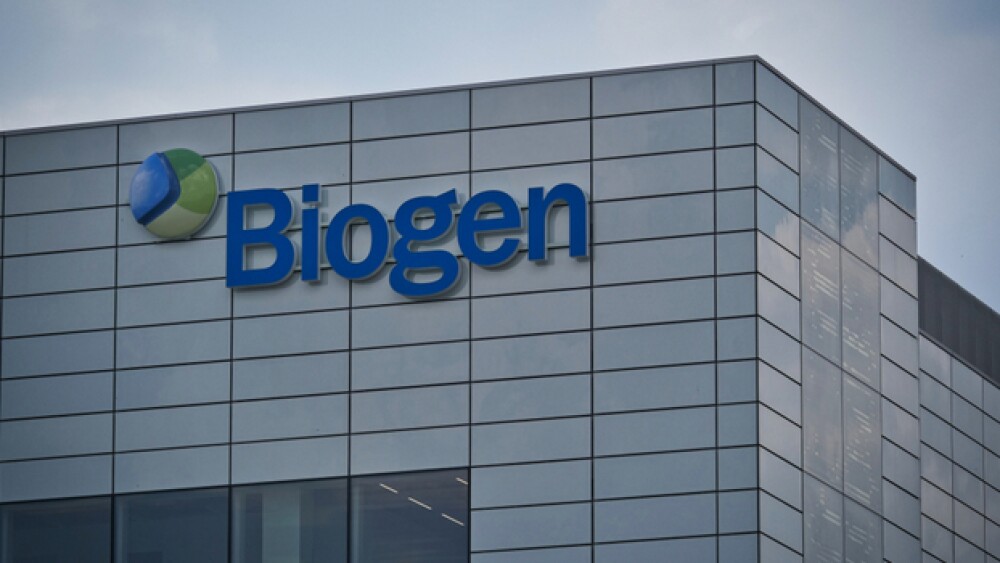The biotech company is collaborating with Israel’s NeuroSense to study how the latter’s amyotrophic lateral sclerosis candidate affects plasma neurofilament levels in patients.
Pictured: A Biogen building/courtesy of PictureDesignSwiss/shutterstock
Biogen has entered into a material transfer agreement with NeuroSense Therapeutics to assess the latter’s amyotrophic lateral sclerosis candidate PrimeC, the Israeli biotech announced in an SEC filing posted Tuesday.
Under the agreement, which was inked in May but was revealed this week, Biogen will look at how PrimeC affects levels of plasma neurofilament—a protein shed by damaged neurons—in amyotrophic lateral sclerosis (ALS) patients enrolled in NeuroSense’s Phase IIb PARADIGM clinical trial. Biogen will provide the funds for the biomarker study and conduct its analysis.
For its part of the deal, NeuroSense will provide blood samples from 69 PARADIGM patients for Biogen’s biomarker study.
The agreement also provides for data sharing: Biogen will furnish NeuroSense with its neurofilament results, while the Israel biotech will disclose the patients’ clinical outcomes, along with findings from other biomarkers being measured. The partners will also jointly evaluate correlations among these endpoints.
PrimeC is an investigational combination therapeutic composed of two FDA-approved drugs, ciprofloxacin and celecoxib, according to NeuroSense’s website. When used at their unique doses in PrimeC’s formulation, these drugs are designed to work together to slow ALS progression, ease inflammation in the neurons and mitigate their degeneration.
In September 2022, NeuroSense released pharmacokinetic data for PrimeC, demonstrating that the candidate was safe and could simultaneously release ciprofloxacin and celecoxib when taken. Combined with data from PARADIGM, this pharmacokinetic profile could help the Israel biotech design and launch a pivotal Phase III ALS study in the U.S.
As part of Tuesday’s agreement, Biogen will also receive a right of first refusal for any potential licensing agreement to co-develop and commercialize PrimeC.
Betting on Biomarkers
Tuesday’s NeuroSense ALS partnership follows Biogen’s regulatory victory for Qalsody (tofersen) for treating superoxide dismutase 1 (SOD1) ALS. Qalsody is the fourth ALS therapeutic authorized in the U.S.
The FDA’s approval is based on biomarker data. In its New Drug Application, Biogen provided data from the Phase III VALOR study, which did not meet its primary endpoint. Patients treated with tofersen did not demonstrate a significant improvement in the Revised Amyotrophic Lateral Sclerosis Functional Rating Scale compared to placebo.
However, tofersen treatment did significantly reduce concentrations of the neurofilament light chain biomarker and the SOD1 protein, which Biogen insisted was a strong predictor of tofersen’s clinical benefit.
In April 2023, the FDA agreed and granted Qalsody accelerated approval. To keep the drug on the market, Biogen must validate its clinical efficacy in a confirmatory study, for which Biogen is proposing to use the ongoing ATLAS study. Data from ATLAS are expected in 2027.
Tristan Manalac is an independent science writer based in metro Manila, Philippines. He can be reached at tristan@tristanmanalac.com or tristan.manalac@biospace.com.
Clarification (June 15): This story has been updated from its original version to clarify that the transaction between Biogen and NeuroSense is a material transfer agreement rather than a collaboration.






